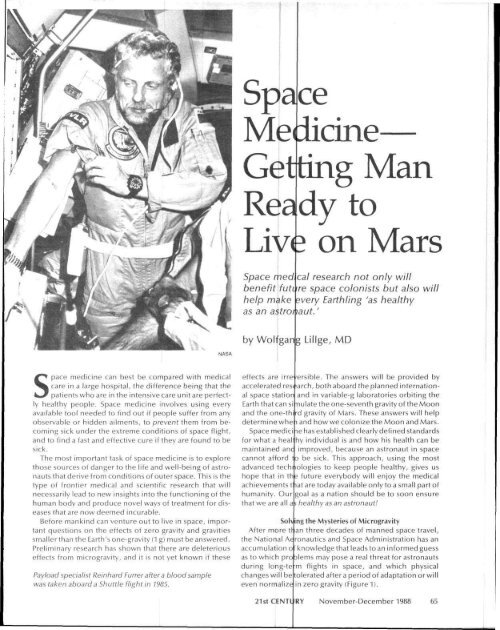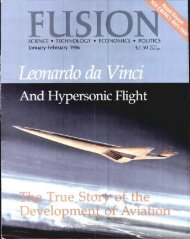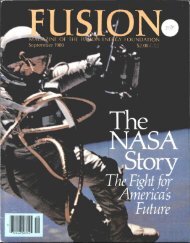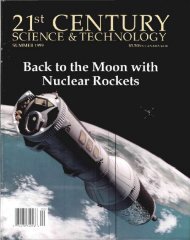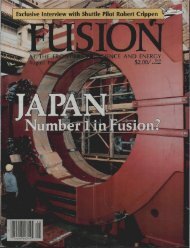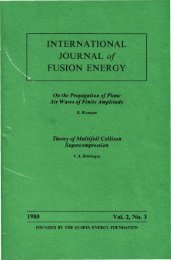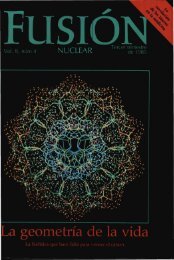21st CENTURY
21st CENTURY
21st CENTURY
You also want an ePaper? Increase the reach of your titles
YUMPU automatically turns print PDFs into web optimized ePapers that Google loves.
Space medicine can best be compared with medical<br />
care in a large hospital, the difference being that the<br />
patients who are in the intensive care unit are perfectly<br />
healthy people. Space medicine involves using every<br />
available tool needed to find out if people suffer from any<br />
observable or hidden ailments, to prevent them from becoming<br />
sick under the extreme conditions of space flight,<br />
and to find a fast and effective cure if they are found to be<br />
sick.<br />
The most important task of space medicine is to explore<br />
those sources of danger to the life and well-being of astronauts<br />
that derive from conditions of outer space. This is the<br />
type of frontier medical and scientific research that will<br />
necessarily lead to new insights into the functioning of the<br />
human body and produce novel ways of treatment for diseases<br />
that are now deemed incurable.<br />
Before mankind can venture out to live in space, important<br />
questions on the effects of zero gravity and gravities<br />
smaller than the Earth's one-gravity (1 g) must be answered.<br />
Preliminary research has shown that there are deleterious<br />
effects from microgravity, and it is not yet known if these<br />
Payload specialist Reinhard Furrer after a blood sample<br />
was taken aboard a Shuttle flight in 1985.<br />
Space<br />
Medicine—<br />
Getting Man<br />
Ready to<br />
Live on Mars<br />
Space medi cal research not only will<br />
benefit future space colonists but also will<br />
help make every Earthling 'as healthy<br />
as an astroibaut<br />
by Wolfgang Lillge, MD<br />
effects are irrcersible. The answers will be provided by<br />
accelerated res< larch, both aboard the planned international<br />
space station and in variable-g laboratories orbiting the<br />
Earth that can si nulate the one-seventh gravity of the Moon<br />
and the one-thi rd gravity of Mars. These answers will help<br />
determine whe 1 and how we colonize the Moon and Mars.<br />
Space medici ie has established clearly defined standards<br />
for what a heal hy individual is and how his health can be<br />
maintained anc improved, because an astronaut in space<br />
cannot afford ID be sick. This approach, using the most<br />
advanced technologies to keep people healthy, gives us<br />
hope that in the future everybody will enjoy the medical<br />
achievements t lat are today available only to a small part of<br />
humanity. Our goal as a nation should be to soon ensure<br />
that we are all ap healthy as an astronaut!<br />
Sol\ ing the Mysteries of Microgravity<br />
After more tl an three decades of manned space travel,<br />
the National At ronautics and Space Administration has an<br />
accumulation of knowledge that leads to an informed guess<br />
as to which pro jlems may pose a real threat for astronauts<br />
during long-te m flights in space, and which physical<br />
changes will be tolerated after a period of adaptation or will<br />
even normalize in zero gravity (Figure 1).<br />
<strong>21st</strong>CENTtiRY November-December 1988 65


